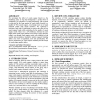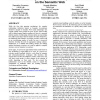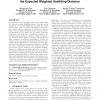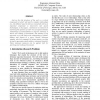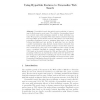1365 search results - page 7 / 273 » Using Web-Search Results to Measure Word-Group Similarity |
WWW
2007
ACM
14 years 8 months ago
2007
ACM
We investigate the effect of search engine brand (i.e., the identifying name or logo that distinguishes a product from its competitors) on evaluation of system performance. This r...
WWW
2005
ACM
14 years 8 months ago
2005
ACM
While the idea that querying mechanisms for complex relationships (otherwise known as Semantic Associations) should be integral to Semantic Web search technologies has recently ga...
WWW
2010
ACM
14 years 2 months ago
2010
ACM
We introduce a new dissimilarity function for ranked lists, the expected weighted Hoeffding distance, that has several advantages over current dissimilarity measures for ranked s...
ICDE
2006
IEEE
14 years 1 months ago
2006
IEEE
Just as the link structure of the web is a critical component in today's web search, complex relationships (i.e., the different ways the dots are connected) will be an import...
KDD
2004
ACM
14 years 7 months ago
2004
ACM
Personalized search has gained great popularity to improve search effectiveness in recent years. The objective of personalized search is to provide users with information tailored ...
